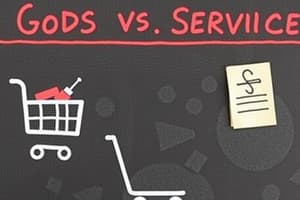Podcast
Questions and Answers
What is referred to as the voluntary trade of goods and services?
What is referred to as the voluntary trade of goods and services?
- Enterprise
- Exchange (correct)
- Commodity
- Market
Which type of goods are available to all without charge and are considered gifts of nature?
Which type of goods are available to all without charge and are considered gifts of nature?
- Capital goods
- Merit goods
- Public goods
- Free goods (correct)
What is the term for the physical and mental contribution of individuals to the creation of goods and services?
What is the term for the physical and mental contribution of individuals to the creation of goods and services?
- Capital
- Market
- Labour (correct)
- Enterprise
What is the division of labour into specific tasks to speed up the process and increase productivity?
What is the division of labour into specific tasks to speed up the process and increase productivity?
What is money used in the organisation to acquire assets?
What is money used in the organisation to acquire assets?
What is the term for the earliest form of man as an ‘economic animal’ where people cultivated the land and reared animals to provide for their needs?
What is the term for the earliest form of man as an ‘economic animal’ where people cultivated the land and reared animals to provide for their needs?
What is the term for goods that can be consumed by all and are usually paid for by taxation?
What is the term for goods that can be consumed by all and are usually paid for by taxation?
What is the term for intangible products which have been produced?
What is the term for intangible products which have been produced?
What is the main limitation of the double coincidence of wants in the barter system?
What is the main limitation of the double coincidence of wants in the barter system?
What is the main purpose of the development of a system of 'money'?
What is the main purpose of the development of a system of 'money'?
What is an example of a limitation of the divisibility of goods in the barter system?
What is an example of a limitation of the divisibility of goods in the barter system?
What is an example of electronic payment method?
What is an example of electronic payment method?
What is the function of a credit company in the use of credit cards?
What is the function of a credit company in the use of credit cards?
What is the term used to describe the use of the internet to make purchases?
What is the term used to describe the use of the internet to make purchases?
Flashcards are hidden until you start studying
Study Notes
Business Concepts
- Enterprise refers to the taking of risks in establishing a business.
Goods
- Goods are tangible products that have been produced, e.g. cars, rice, clothing, etc.
- Types of goods:
- Free goods: available to all without charge, e.g. air, sea, sunshine, etc.
- Public goods: can be consumed by all, usually paid for by taxation, e.g. national defence.
- Merit goods: provide benefits to the consumer and society, e.g. health services, education.
Services
- Services are intangible products, e.g. banking, transportation, insurance, etc.
Market and Commodity
- Market: any place where buyers and sellers meet to engage in trade.
- Commodity: any final good used for some purpose.
Capital and Labour
- Capital: money used to acquire assets, or items (factories, equipment, machinery, etc.) used to create final products.
- Labour: physical and mental contribution of individuals to the creation of goods and services.
Specialisation
- Specialisation: division of labour into specific tasks to increase productivity and decrease unit cost.
Development of Instruments of Exchange
- Early times: direct production or subsistence economy, where people cultivated land and reared animals to provide for their needs.
- Production increased, leading to a surplus of goods, and the system of barter resulted.
- Problems with barter:
- Double coincidence of wants
- Exchange rate
- Divisibility of goods
- Storage of wealth
- Development of money: from shells, beads, arrowheads, fishhooks, gold, and animal teeth to modern forms of money.
- Modern forms of money:
- Credit cards
- Debit cards
- Cheques
- Electronic transfer
- Tele-banking
- E-commerce
Studying That Suits You
Use AI to generate personalized quizzes and flashcards to suit your learning preferences.




